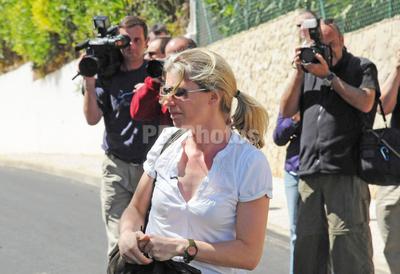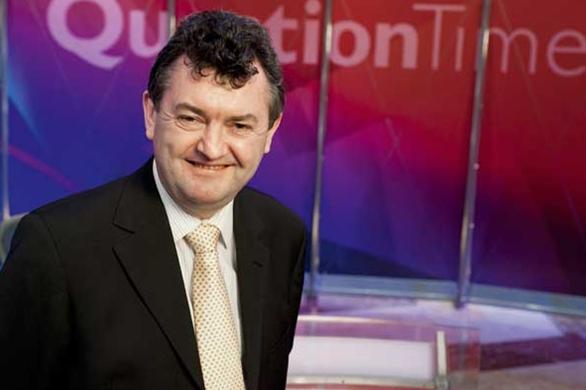Five opinionated panellists, an
unpredictable audience to grill
them and minimal editorial
control: Question Time, as
executive producer Steve
Anderson notes, might be hard to
get off the ground these days.
“None of the questions get
rewritten,” he says. “None of
the politicians get told what
they are going to be asked. When
I first came to the show, I was
terrified of how little we knew
about what was going to happen.
“We’re lucky the BBC has lived
with the show so long and
understands it. All these
control freaks who exist now in
commissioning across all the
broadcasters, they’d throw you
out of the window… It could feel
too risky.”
Yet BBC1’s current affairs
stalwart is going from strength
to strength. Last month, an
edition from Grimsby in which a
furious audience heckled
Margaret Beckett over expenses
got 3.8 million viewers - the
series’ best-ever rating. The
following week, BBC1 controller
Jay Hunt made the most of the
scandal by moving the show for
one week, from its usual 10.35pm
slot to 9pm. The strategy paid
off, and this conservative
30-year-old format comfortably
won the slot against the likes
of Taggart and Katie & Peter:
Stateside with 3.7 million
viewers (17.1% share).
For Anderson, who is also
creative director of Mentorn
Media, the success is part and
parcel of an ”incremental”
evolution of Question Time, in
force since the company took the
reins in 1999.
“Any change you make has to be
almost invisible,” he says. “I
think Question Time is the
closest thing BBC1 has got to
Radio 4 and the audience that
watches it is really very
similar to the audience of R4.
We are custodians of their
property and you treat it with
care and respect.”
First, it introduced a
non-political fifth panellist to
offset the party-political
line-up, then it focused on
”hardwiring” the show into the
news - booking guests later so
it could tailor them to that
week’s stories. More recently,
celebrities such as Will Young
and Fern Britton have joined the
panel, and the show has moved
from universities and leisure
centres to council estates and
schools, courtesy of new
portable seating.
The latter is an unglamorous
addition that makes a huge
difference, says Anderson.
“[Before], when we went to
Liverpool - my city - we went
to the University of Liverpool.
On the council estate where I
lived, in Kirkby, the University
of Liverpool was some ivory
tower you’d never go to.
Question Time is not some
middle-class ghetto.”
From 2010, it is not just the
filming that will move. The
centre of production is being
shifted, lock, stock and -
debatably - barrel, to Scotland
in line with the BBC’s nations
and regions targets. Presenter
David Dimbleby has been vocal
about his anxiety over the plans
but Anderson is more
circumspect, preferring to fix
the problem behind the scenes.
He will not go into details but
says Mentorn has been working on
a plan that enables him to
remain with the programme and as
a London resident - and that the
BBC is currently “very
receptive”.
He is equally coy on Question
Time’s position in the
schedules, insisting 10.35pm is
the right place for it despite
the rip-roaring success of its
9pm experiment, and despite its
current weekly clash with
Newsnight on BBC2. “Sadly for
Newsnight, it normally comes off
a lot worse from the clash than
Question Time.
“Question Time is such a big
event now that the political
classes don’t want to miss it,”
he says. But doesn’t the BBC
cannibalising its own audience
seem a bit, well, mad? Anderson
laughs sheepishly. “I don’t
know. It’s not for me to say.”
Understandably, he does not want
to rock the boat with the BBC.
Besides, he is only too aware of
what makes a good news story.
Anderson started out as a print
journalist when, aged 14 and
dreaming of becoming the
Liverpool FC reporter on the
Liverpool Echo, he volunteered
regular reports on school
football matches for his local
paper, the Kirkby Reporter. That
paved the way for a
school-leavers’ traineeship at
South Lancashire Newspapers. By
19, he was interviewing Harold
Wilson and, judging from his
litany of adventures, he has
covered most major wars and
events in UK politics since.
It’s a relief to find Anderson
affable not intimidating. Even
his boasts (the day he
gatecrashed an ITV interview to
snare Michael Heseltine - who
had just resigned as defence
secretary - for the BBC) are
told with a sort of twinkling
nostalgia you would expect from
a war hero’s tales of
derring-do.
All the same, after two decades
working for broadcasters -
latterly as ITV’s head of news
and current affairs - joining
the indie sector came as a jolt.
“For my last Christmas at ITV, I
got something like 400 Christmas
cards and for my first Christmas
at Mentorn, I got four,” he
recalls.
While Question Time is very
definitely Mentorn’s “blue-chip”
calling card, the indie also has
form in other genres, with drama
hits such as Britz and Endgame
and shiny-floor shows such as
Sky 1’s Hairspray: The School
Musical. However, it is factual
programming that fits most
closely with Anderson’s
interests, and that is forming
the bedrock of Mentorn’s
business in the economic
downturn.
It is, Anderson says, a
“double-edged sword”. On the one
hand, it is the easiest genre in
which to trim budgets without
compromising the quality or
“mightily” annoying the talent.
On the other, it is taking the
place of other, more expensive
shows broadcasters can no longer
afford.
“There are certain slots on
certain commercial channels that
would normally be £700,000
dramas and have now turned into
£200,000 factual productions.
There are at least two
miniseries that we’ve [won
commissions for] that would
raise eyebrows in normal times.”
Unsurprisingly, he won’t name
names.
Certainly Mentorn’s subsidiary
Folio is doing an impressive
trade in “blue light” shows such
as BBC1’s Traffic Cops and
Five’s Soho Blues - which are
quick to make and rate strongly
(Motorway Cops attracted
6.5 million viewers on BBC1 in
January). Meanwhile, Anderson
has masterminded a string of
access-based docs on the
McCanns’ hunt for Madeleine, for
the BBC, Channel 4 and ITV.
Proof, surely, that must-have
content still wins commissions.
 |
| Emma Loach |
Both types of programme rely on
Mentorn’s ability to secure
access. Anderson makes sure he
has the right staff to do this
(he hired the director, mother
of three Emma Loach, to forge a
relationship with Kate McCann)
but also plays the long game,
entering a two-way relationship
with his subjects whether
calculatingly or by accident.
“We’re not a company that goes
in and does a programme about
someone and then drops them,” he
says.
Certainly it’s a strategy that
has worked for Anderson - and is
paying dividends for Question
Time, too. He fishes in his
pocket for a quote written by
journalist Jeff Jarvis about
Google, but that also
encapsulates the series’
relationship with its audience.
“‘The more you control, the less
you will be trusted. The more
you hand over control, the more
trust you will earn,’” he says.
“I think that’s what we do.”



